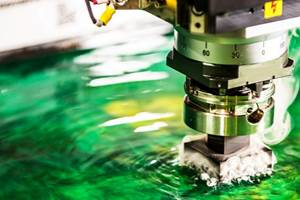Metalworking Fluids Address Increasing Demands
This line of metal removal emulsion technology products offers end users of metalworking fluids a defined selection of choices to suit their specific needs for process efficiency and lower total cost of ownership.
The term “metalworking fluids” can apply to a number of chemical formulations that encompass a range of applications on the shop floor. They generally can be divided into four main categories: neat oils, water miscible oils, semi-synthetics, and full synthetics, with each carrying its own strengths and weaknesses relating to machine tool and part corrosion protection as well as environmental and employee safety.
Driven by increasing performance demands, including evolving health, safety and environmental standards, Quaker Chemical Corp. has recently introduced a portfolio of metal removal emulsion technology to the North American market. The portfolio is composed of two product lines: QuakerCool 7000, designed for aluminum and multi-metal machining, and QuakerCool 700 for ferrous machining. These products offer end users of metalworking fluids a defined selection of choices to suit their specific needs for process efficiency and lower total cost of ownership.
The higher demand for lubrication in aluminum machining is the primary factor differentiating the aluminum/multi-metal and ferrous series products. Aluminum alloys are more adhesive materials with better elasticity and thermal expansion properties relative to other ferrous materials, which presents a greater challenge in machining. The 7000 Series products are engineered to provide the lubrication needed for the more demanding and critical aluminum machining operations, such as tapping, deep-hole drilling and reaming operations. These fluids are also able to handle most ferrous machining operations. In contrast, the 700 Series products are specifically engineered to provide effective machining properties for ferrous-based materials in all applications.
By reducing the historical use of hazardous materials such as boron, formaldehyde and other substances of concern, both technology platforms are designed to offer a more benign operator experience. Lubrication chemistries are engineered for lower concentrations, and extended sump life and/or removal of formulated petroleum derivatives reduces, and in some cases, eliminates hydrocarbons. The technology is developed keeping important factors such as tooling costs, part quality and productivity in mind.
The chemistries in these products are born from existing product technologies running throughout Europe, Asia and the Americas and have been formulated to meet the specific needs of the North American marketplace. They have been beta tested in the field for more than a year to better understand their performance in different applications and materials, as well as their limitations.
The portfolio of products will serve a diverse marketplace of applications, size and metallurgies mainly targeted for the tiered supplier base to the automotive and heavy equipment industries. The major benefactors of the technology should be producers of metal components with individual machining cells or smaller central systems. The new platforms are engineered to maximize efficiencies of the coolant by providing longer sump life, reduced downtime, less waste generation, better tool life and lower total costs for these types of end users.
Overall, the products are designed to work seamlessly in the targeted process and create clear, simple value for the users in their operations. Metalworking fluids are generally judged in the context of people, planet and profit. These products are engineered to meet or exceed expectations by delivering a better, simpler user
experience in the spirit of doing the right thing for employee and environmental safety.
Related Content
Automate Coolant Management, Collect Data to Optimize Machining Operations
The future of coolant management lies in better control through automation and applying real-time data analysis and insights.
Read MoreCutting Fluid Tailored for Demanding, Multimetal Operations
Master Fluid Solutions’ Trim E715 cutting fluid is formulated for demanding, multimetal operations to provide superior lubricity and corrosion protection with low residue.
Read MoreOelheld IonoPlus High-Performance Dielectrics for EDMs
PMTS 2023: The odorless coolant is said to offer increased removal rates, lower electrode wear, excellent surface qualities, lower refill quantities and longevity to provide lower overall operating costs.
Read MoreThe Case for Higher-Performing Metalworking Fluids
Machine shops have the opportunity to enhance their profitability by choosing the proper metalworking fluids for each machining application.
Read MoreRead Next
A Tooling Workshop Worth a Visit
Marubeni Citizen-Cincom’s tooling and accessory workshop offers a chance to learn more about ancillary devices that can boost machining efficiency and capability.
Read MoreSeeing Automated Workpiece Measurement in Real Time
User-friendly inspection software for CNC machining centers was shown at IMTS 2024 monitoring measurements between and after machining while performing SPC based on recorded measurement values.
Read MoreDo You Have Single Points of Failure?
Plans need to be in place before a catastrophic event occurs.
Read More





















